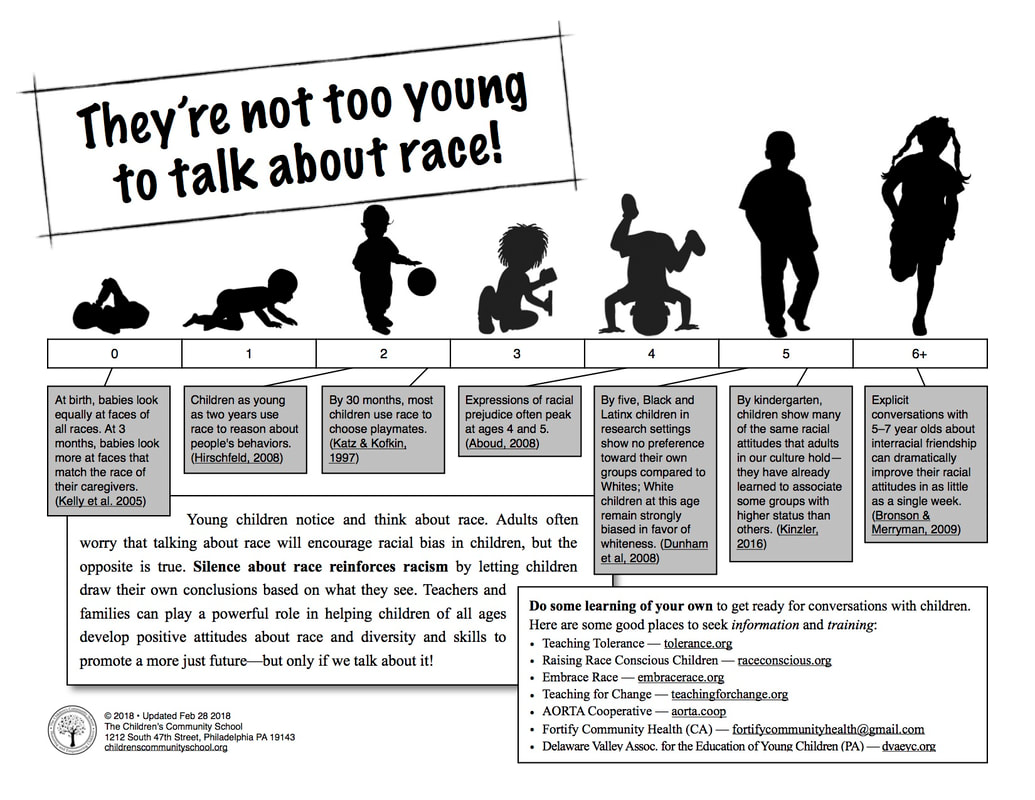Anti-Racist and Anti-Bias Commitments
We believe that children have the right to participate in the world around them from birth and that adults have the responsibility to guide and facilitate their participation. We know that from a few months of age, children start to develop awareness of race.
It is our responsibility as adults who love our children to begin conversations centering anti-racist dialogue in early childhood. To effectively facilitate these conversations, it is crucial that we develop our own understandings of what it means to move from non-racist to anti-racist.
We recognize that education can act as a system of oppression. At this time, when so much of our country is in flux, we have the opportunity to deconstruct, interrupt, and revolutionize education in a way that Black and Indigenous People of Color (BIPOC) are centered instead of marginalized. By elevating the rights of marginalized communities, we elevate the standard of living for all members of our communities.
To our BIPOC families and community, we are here to stand beside you and to listen to you when and if you want to share your perspective. We acknowledge and respect that it is not your responsibility to educate our community.
To our white families and community, we want to partner with you to listen to BIPOC leaders in anti-racism education. As a school, we are in the process of adopting the following commitment statements to guide our work with input from families, community members, and faculty.
We recognize that education can act as a system of oppression. At this time, when so much of our country is in flux, we have the opportunity to deconstruct, interrupt, and revolutionize education in a way that Black and Indigenous People of Color (BIPOC) are centered instead of marginalized. By elevating the rights of marginalized communities, we elevate the standard of living for all members of our communities.
To our BIPOC families and community, we are here to stand beside you and to listen to you when and if you want to share your perspective. We acknowledge and respect that it is not your responsibility to educate our community.
To our white families and community, we want to partner with you to listen to BIPOC leaders in anti-racism education. As a school, we are in the process of adopting the following commitment statements to guide our work with input from families, community members, and faculty.
Commitment Statements
Self |
1) I commit to the ongoing self-reflection, self-work, and education that is imperative to addressing my own biases and prejudices.
2) I commit to dedicating time to learning what I don't know, recognizing that it is necessary to educate myself on the topic of racial justice from a BIPOC-centered lens. |
Interactions with Children |
3) I commit to honoring a strong image of the child by embracing and encouraging conversations about race, racism, differences, privilege, and responsibility recognizing that children are capable of engaging in real conversations about the truths present in our society.
4) I commit to offering BIPOC students emergent, creative, and diverse cognitive challenges that affirm their potential and ability to grow as independent learners. |
Learning Materials and Curriculum
|
5) I commit to creating a learning environment that counters white supremacist models of education (perfectionism, worship of the written word, binary thinking, individualism, objectivity), while understanding that this requires an examination of leadership, principles, and materials at any school or organization I work within.
|
Community
|
6) I commit to acknowledging, celebrating, and utilizing the community cultural wealth present in my classroom community, school community, and neighborhood community.
7) I commit to partnering with BIPOC families to ensure that their values and forms of involvement and engagement are heard, respected, and integrated. |
Within the School
|
8) I commit to seeking the voices of BIPOC researchers and pedagogues, checking the sources of any information on best practice, child development, educational psychology, and other research that informs our work.
9) I commit to critically evaluating "developmentally appropriate practice" and other recommendations from white researchers to ensure that BIPOC children and families are seen as "at-promise" rather than "at-risk", interrupting deficit perspectives. 10) I commit to protect and respect the time and emotional energy of BIPOC colleagues by educating myself and advocating within my workplace, not expecting others to take on the burden. 11) I commit to insisting that my workplaces and professional communities make actionable efforts to support diverse leadership, even when this means giving up my own leadership role to make room. |
Outside of the School
|
12) I commit to using my privilege to fight for and highlight BIPOC voices at every opportunity and level of discussion, including stepping back when a BIPOC person can do the job instead.
13) I commit to examining the racist and harmful systems in education that maintain segregation within and among our schools from a perspective of radical reenvisioning rather than reform, ready to abolish systems that were not designed to adequately serve BIPOC children. |
Commitment statements developed by educators in the 2019-2020 Boulder Journey School Teacher Education Residency Program

